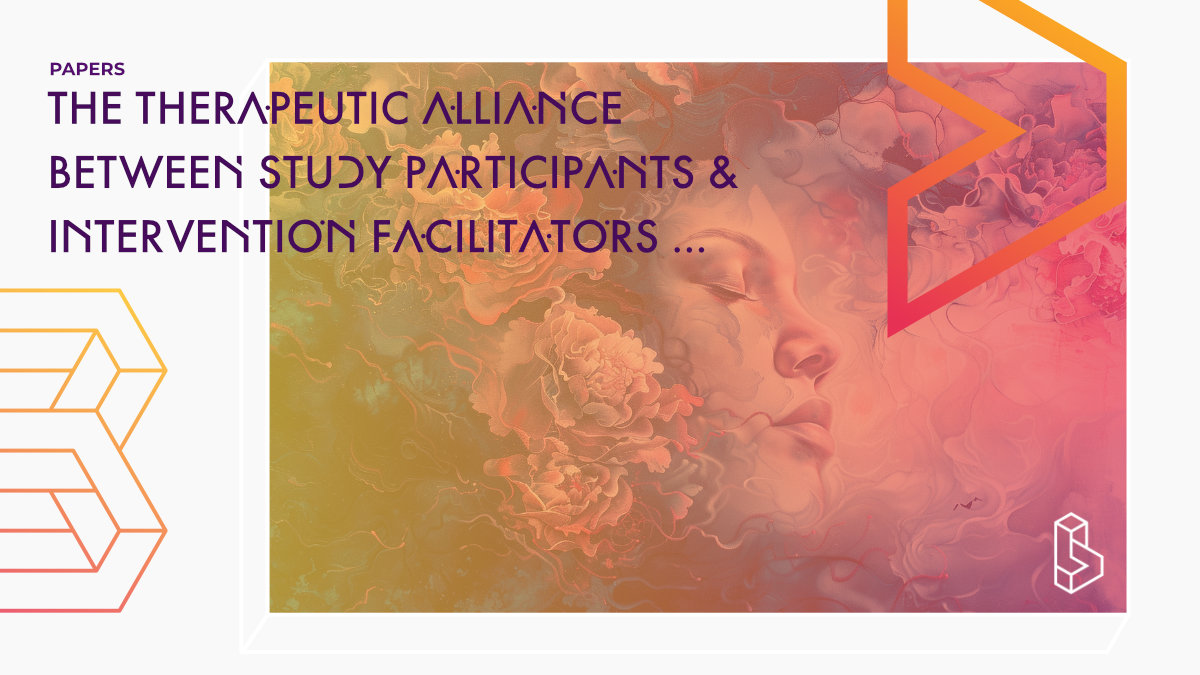This randomized, waiting list-controlled clinical trial (n=24) for depression (MDD) assessed the therapeutic alliance between participants and intervention facilitators in psilocybin-assisted therapy (PAT). Therapeutic alliance significantly increased from the final preparation session to one-week post-intervention, with a stronger alliance predicting depression scores at various post-intervention time points. Stronger alliances were correlated with peak ratings of mystical experiences and psychological insight, which in turn were correlated with depression scores.
Abstract of The therapeutic alliance between study participants and intervention facilitators is associated with acute effects and clinical outcomes in a psilocybin-assisted therapy trial for major depressive disorder
“We examined if the therapeutic alliance between study participants and intervention facilitators in a psilocybin-assisted therapy (PAT) trial changed over time and whether there were relationships between alliance, acute psilocybin experiences, and depression outcomes. In a randomized, waiting list-controlled clinical trial for major depressive disorder in adults (N = 24), participants were randomized to an immediate (N = 13) or delayed (N = 11) condition with two oral doses of psilocybin (20mg/70kg and 30mg/70kg). Ratings of therapeutic alliance significantly increased from the final preparation session to one-week post-intervention (p = .03, d = .43). A stronger total alliance at the final preparation session predicted depression scores at 4 weeks (r = -.65, p = .002), 6 months (r = -.47, p = .036), and 12 months (r = -.54, p = .014) post-intervention. A stronger total alliance in the final preparation session was correlated with higher peak ratings of mystical experiences (r = .49, p = .027) and psychological insight (r = .52, p = .040), and peak ratings of mystical experience and psychological insight were correlated with depression scores at 4 weeks (r = -.45, p = .030 for mystical; r = -.75, p < .001 for insight). Stronger total alliance one week after the final psilocybin session predicted depression scores at 4 weeks (r = -.85, p < .001), 3 months (r = -.52, p = .010), 6 months (r = -.77, p < .001), and 12 months (r = -.61, p = .001) post-intervention. These findings highlight the importance of the therapeutic relationship in PAT. Future research should explore therapist and participant characteristics which maximize the therapeutic alliance and evaluate its relationship to treatment outcomes.”
Authors: Adam W. Levin, Rafaelle Lancelotta, Nathan D. Sepeda, Natalie Gukasyan, Sandeep Nayak, Theodore L. Wagener, Frederick S. Barrett, Roland R. Griffiths & Alan K. Davis
Summary of The therapeutic alliance between study participants and intervention facilitators is associated with acute effects and clinical outcomes in a psilocybin-assisted therapy trial for major depressive disorder
Introduction
Psychedelic-assisted therapy (PAT) is a therapeutic intervention that combines the administration of a psychedelic drug with hours of preparatory and integrative psychotherapy, as well as supportive, nondirective, therapy during the actual drug session.
The therapeutic alliance, broadly defined as the sense of collaboration between patient and clinician, is associated with positive treatment outcomes. However, few studies have empirically investigated the effect of the therapeutic alliance on outcomes in PAT.
Find this paper
https://doi.org/10.1371%2Fjournal.pone.0300501
Open Access | Google Scholar | Backup | 🕊
Cite this paper (APA)
Levin, A. W., Lancelotta, R., Sepeda, N. D., Gukasyan, N., Nayak, S., Wagener, T. L., ... & Davis, A. K. (2024). The therapeutic alliance between study participants and intervention facilitators is associated with acute effects and clinical outcomes in a psilocybin-assisted therapy trial for major depressive disorder. Plos one, 19(3), e0300501.
Study details
Compounds studied
Psilocybin
Topics studied
Depression
Study characteristics
Double-Blind
Longitudinal
Within-Subject
Randomized
Follow-up
Participants
24
Humans
Linked Clinical Trial
Effects of Psilocybin in Major Depressive DisorderThe proposed pilot study will assess whether people with major depressive disorder experience psychological and behavioral benefits and/or harms from psilocybin.

